On Thursday Greenwich’s Board of Selectmen voted to increase mandatory requirements to conserve water by Greenwich residents. *(see full list below)
Two weeks ago the board voted to enact a town ordinance, article 5, and require residents to cease irrigating lawns, though there were a list variances, such as one for newly planted lawns.
On Thursday, the Board of Selectmen’s vote to move to Phase 2 of restrictions means the variances no longer apply.
“All variances are null and void,” said Sergeant Slusarz of Greenwich Police. “There is a mandatory ban of all outdoor watering, with the one exception of watering to sustain food crops for harvest for commercial crops. For residents, watering of plantings is only allowed by bucket or watering can.”
Sergeant Slusarz pointed out that in addition to mandatory requirements*(see below), all residents are required to reduce water usage by 20%.
Lt. Kraig Gray said residents should think about decreasing their loads of laundry, showers and use of dishwashers. “The police are taking care of what is in public view, but all of the officials are thinking about water use in private,” he said. He added that the solution is a two-prong approach that includes Aquarion’s response on the supply side, but equally important is the public’s conservation efforts.
John D’Andrea, owner of Greenview Sprinklers in Greenwich, said he’s been hearing from many of customers this week. “We have been helping our customers get their systems shut off to comply with the watering ban,” he said.
The Department of Public Works is no longer using water when in street-sweepers for street cleaning. The Department also is limiting routine maintenance of sewer lines with the use of vacuum trucks because of the water needed to clean the lines.
All playing field maintenance, re-sodding and tree plantings have been deferred until spring by the Parks & Recreation Department. And all field sprinkler systems have been shut down. The Department’s boat bottom cleaning program that is underway as mariners haul out their boats from Town marinas employs a water recycling program. The Griffith Harris Golf Club is irrigating only tees and greens with water from a pond on the course
Sergeant Slusarz said that since Phase 1 of the ban went into effect on Sept 22, Greenwic Police have issued 67 Warnings to residents, 71 instances of “Education of Property Owner,” 7 incidents categorized as “unfounded” and 4 “Active” calls as of October 6.
Slusarz said that as of Oct 6, there have been no fines levied, though the potential fine is $91.00.
“In only three instances the police have been required police to visit a resident twice,” he said, adding that those situations were instances of a resident not being home and police having to go, for example, to the person’s workplace to contact them in person.
“In all cases, the resident complied with the ban,” Slusarz said.
Residents are required to make sure that all plumbing and air conditioning systems that use water are in good repair with no leakage.
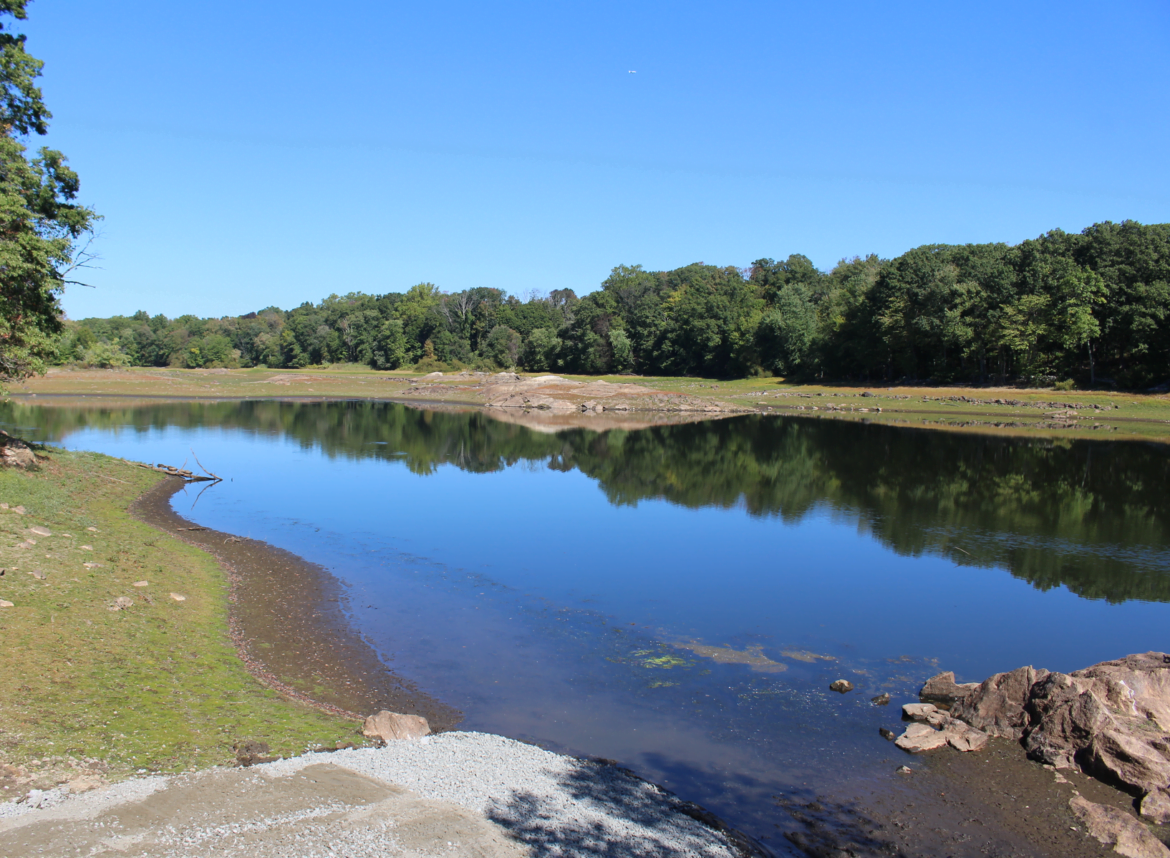
View of depleted reservoir from South Stanwich Road, Oct. 6, 2016 Credit: Leslie Yager
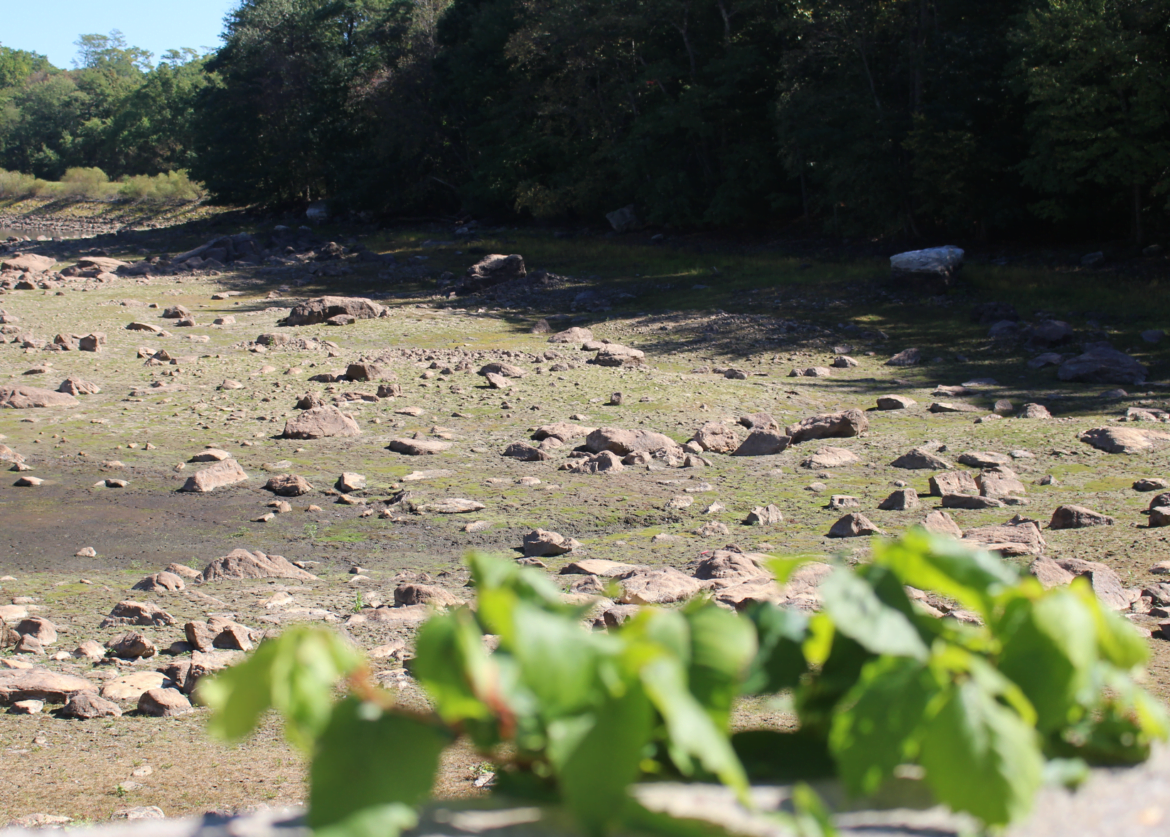
View of reservoir from North Street just off Merritt Parkway, Oct 6, 2016 Credit: Leslie Yager
Reached by phone, Greenwich’s Conservation Commission Director Denise Savageau said the Phase 2 water ban was enacted to prep Greenwich for a worst-case scenario.
EMERGENCY OVERGROUND WATER PIPELINE
She said that due to the emergency created by the drought, water is being piped from Barge Reservoir, to Rockwood and then to Putnam reservoir which is where the treatment plant is located.
Savageau said normally water is piped among these reservoirs, but those pipes have a limited capacity. She said the emergency overground pipes, meant to augment the town’s water supply, are visible on a drive up Taconic Road to Farms Road.
“The overground pipes are a temporary measure to bring an increased amount of water,” Savageau said. “It is quite a distance to transfer the water.”
Savageau said the Greenwich reservoir system, which includes four reservoirs –Barge, Rockwood, Brush and Putnam – is at 29% capacity. Usually this time of year they are at 65% capacity.
The good news is that residents’ cooperation has made a difference.
“Two weeks ago we had just a 60 day water supply,” Savageau said. “Today we have a 90 day supply, and that is because of reduced demand. We are expanding the number of days we can survive if we keep demand low.”
“Before the mandatory watering ban we were pumping 14 million gallons a day. Now we’re pumping 5 million gallons a day because people are cooperating,” Savageau said. “Actions are making a difference. Keep it up!”
Savageau said the change of season won’t necessarily result in the end of the drought. “We don’t want the water to get tied up in ice over the winter.”
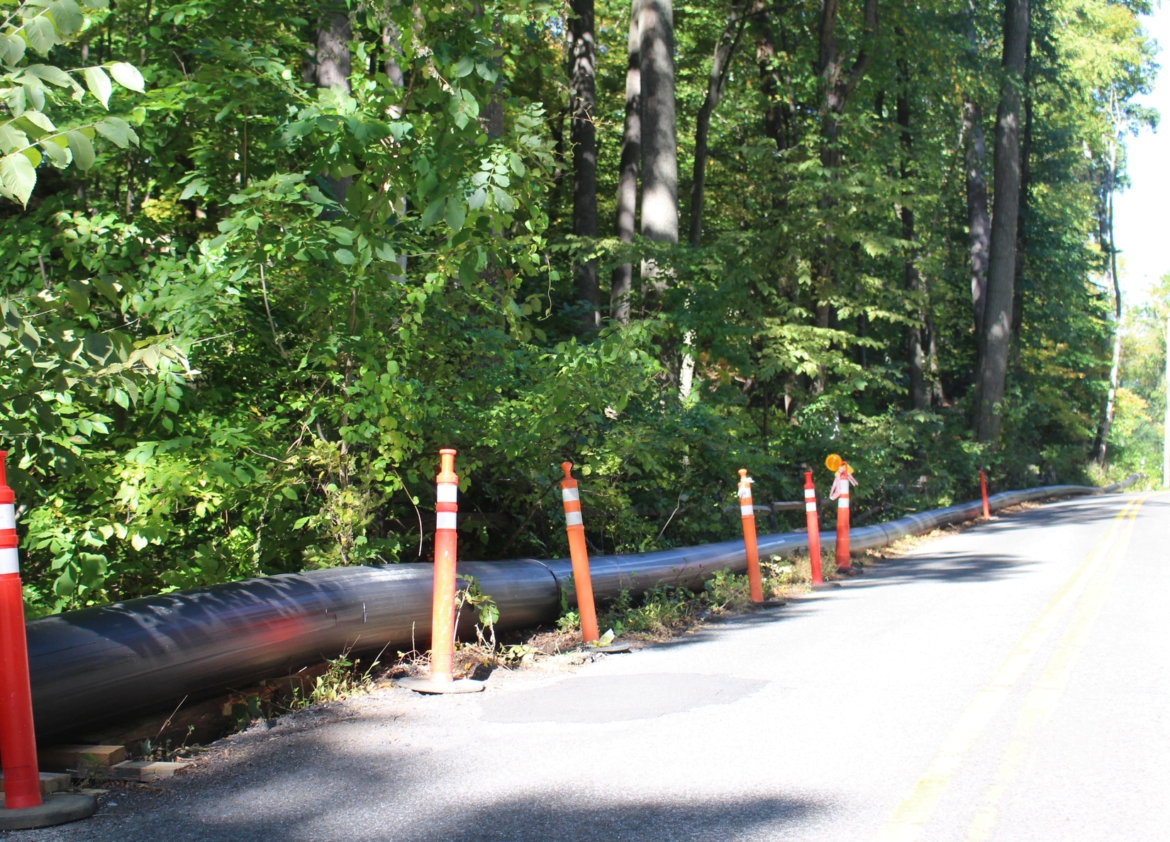
Along Farms Road, emergency overground pipeines move water from reservoir to reservoir in back country. October 6, 2016 Credit: Leslie Yager
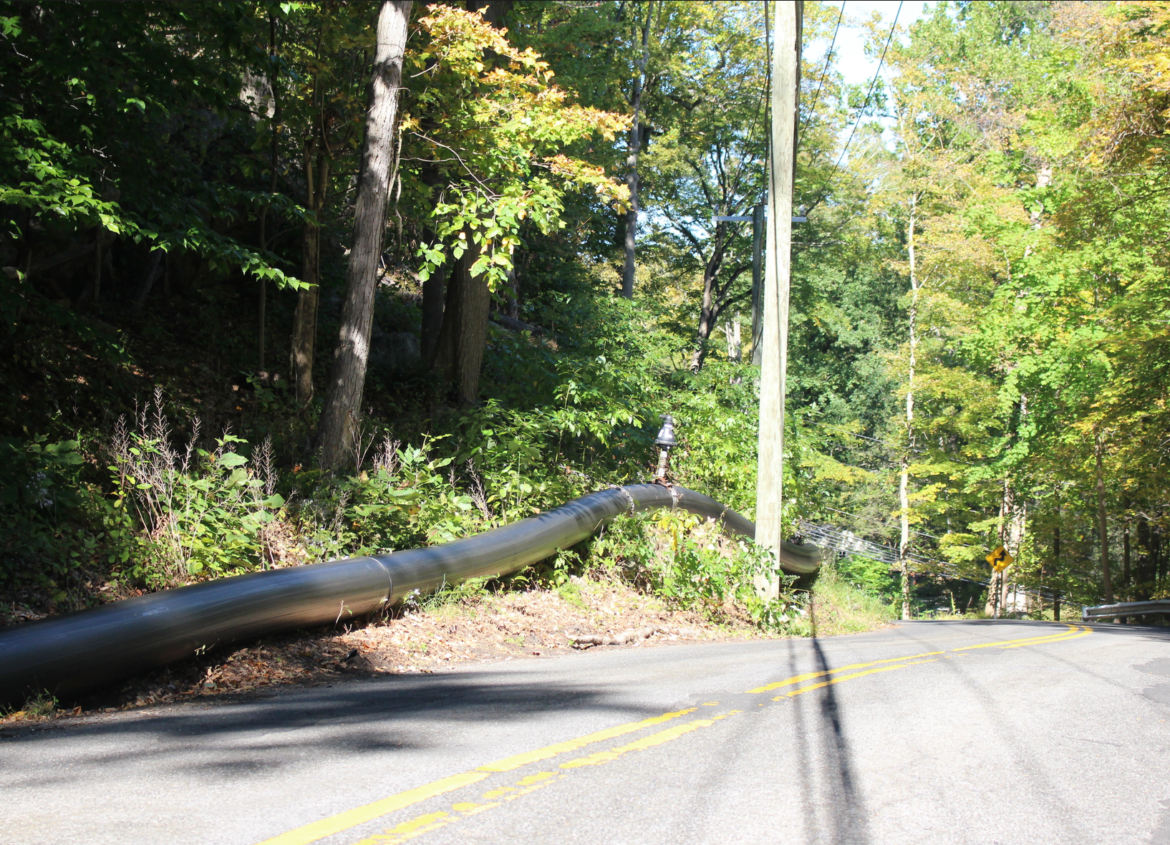
Along Farms Road, emergency overground pipeines move water from reservoir to reservoir in back country. October 6, 2016 Credit: Leslie Yager
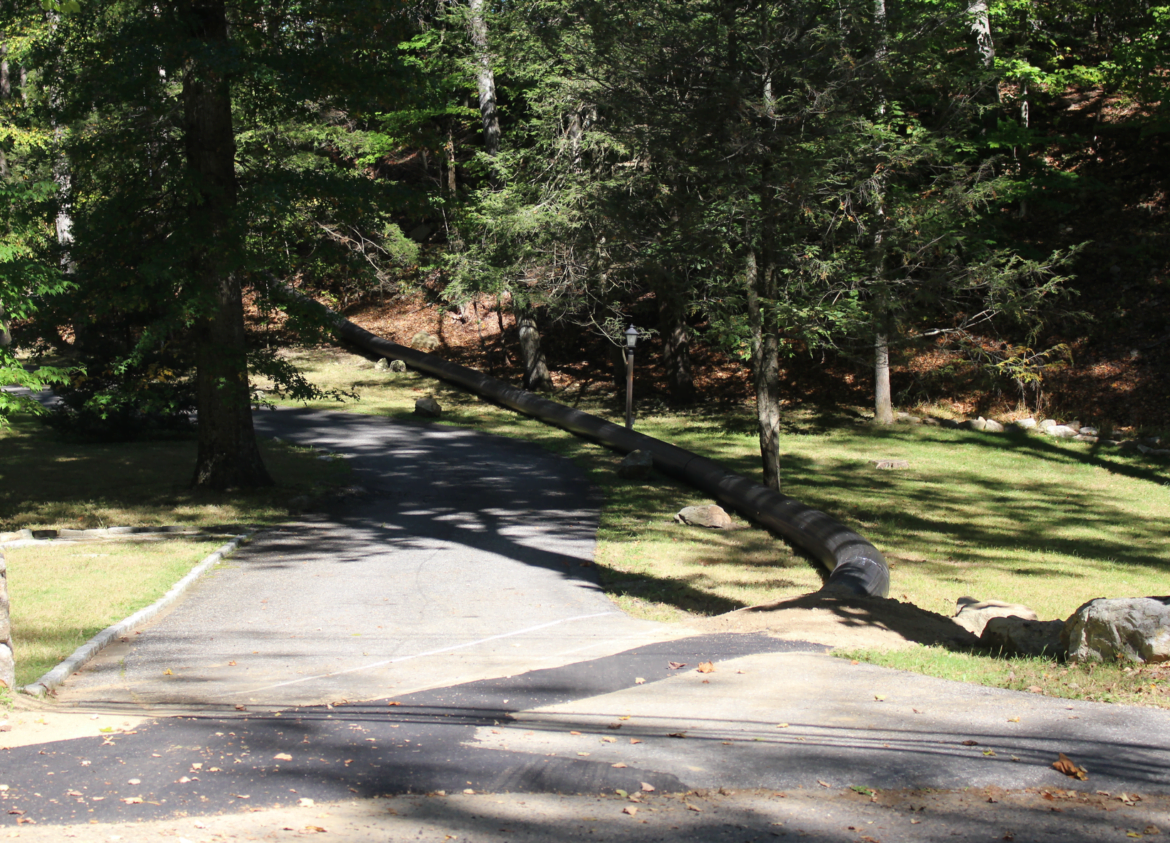
Along Farms Road, an emergency overground pipeline initiating at the Barge Reservoir emerges from the woods and moves along Farms Road and over to Taconic Road. October 6, 2016 Credit: Leslie Yager
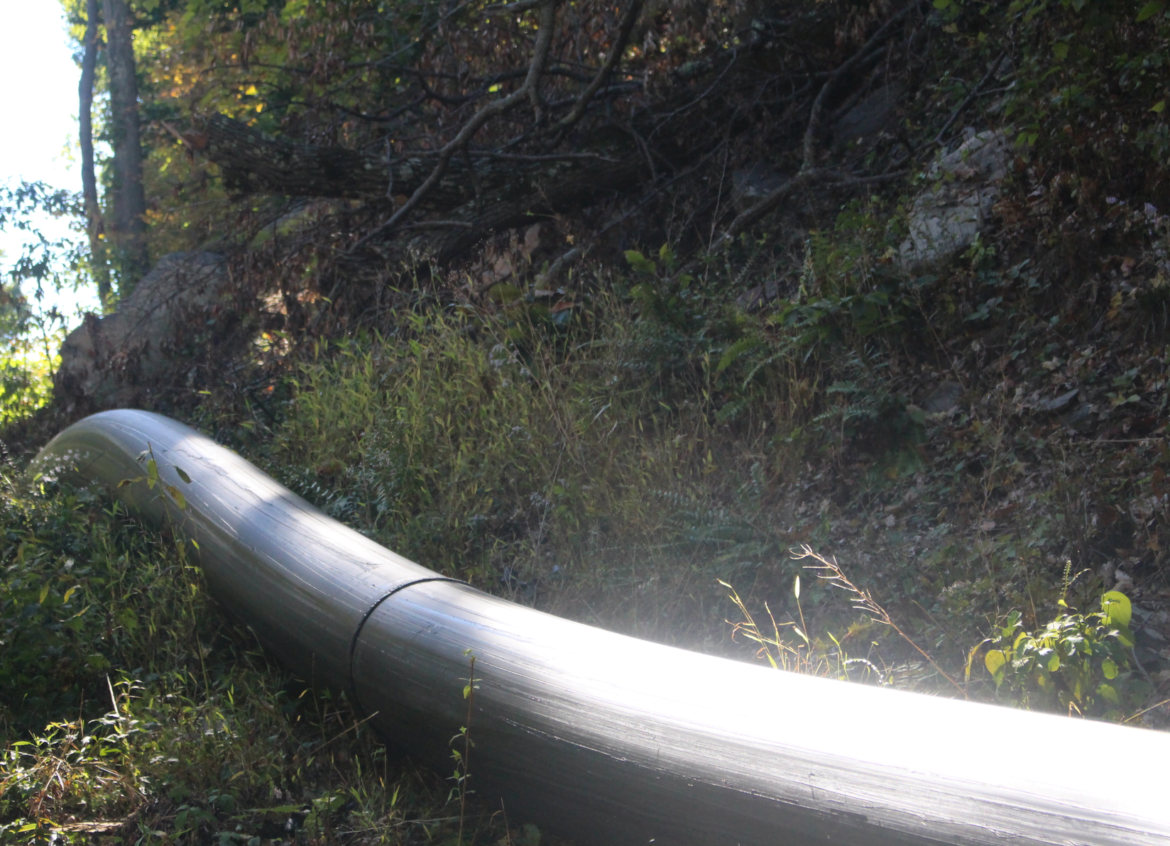
Emergency overground pipeline running alongside Farms Road toward Taconic Road, moving water from the Barge Reservoir to Putnam Reservoir. October 6, 2016 Credit: Leslie Yager
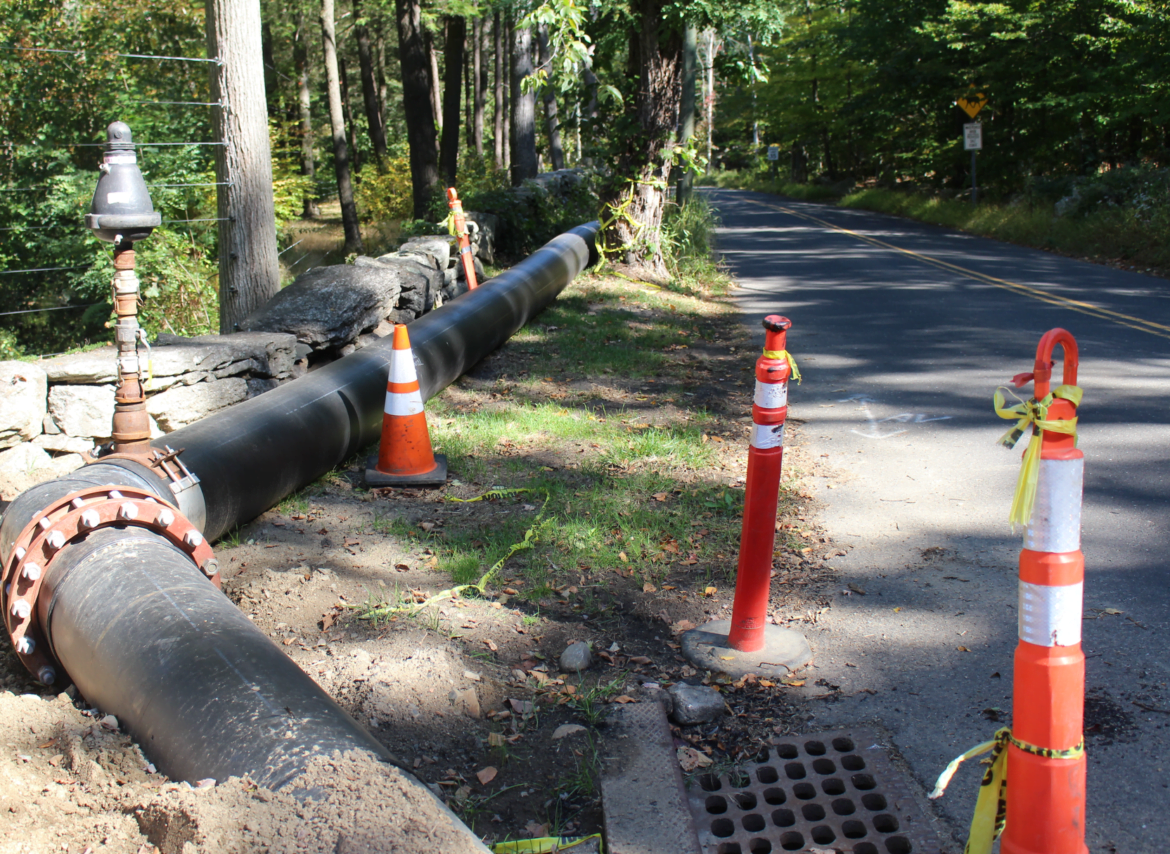
At the intersection of Farms Road and Taconic Road, an emergency overground water pipeline moves underground. October 6, 2016 Credit: Leslie Yager
Complete water ban details:
1. Water Supply Emergency Phase II – For Implementation immediately.
1.1. The use of fire hydrants for any purpose other than fire protection, public health requirements, or other emergency or authorized use, is prohibited.
1.2. Outdoor Water Irrigation
1.2.1. Mandatory water ban of all outdoor watering unless necessary to sustain food crops or crops for harvest by commercial farms. Watering of new plantings is allowed by bucket or watering can.
1.2.2. Water use for irrigation of existing lawns is prohibited. Variances for newly seeded lawns and plantings issued during Phase I are null and void. To protect water resources from siltation, variances may be granted by the Conservation Director for seeding (no sod) of bare soil to limit erosion.
1.2.3. Watering of plants at commercial operations is allowed according to restrictions in section 1.6.
1.2.4. New plantings and lawn seeding/sodding should be postponed for a late fall or spring planting.
1.3. Prohibition of all other outdoor water uses, including but not limited to:
1.3.1. Use of water for private and/or public ornamental or decorative purposes including but not limited to fountains, waterfalls, reflecting pools, and/or ponds.
1.3.2. Use of water to wash or clean motor vehicles or vessels unless done as a means of livelihood at a commercial facility with recycling system in place
1.3.3. (see section 1.8). Boats being removed from the water for the winter season may use hand held hose or bucket to clean bottom.
1.3.4. Use of water to flush driveway, sidewalks, decks or other outdoor surfaces.
1.3.5. Use of water to clean outsides of buildings, decks or structures. No power washing is allowed.
1.3.6. Use of water to clean windows unless done as a means of livelihood and only then by washing exclusively from a bucket or container of three (3) gallons capacity or less.
1.4. No new water diversions or hookups are to be allowed to provide for outdoor or non-essential use. This includes the drilling of new irrigation wells, or diversions from ponds, streams or other surface waters. All residents are asked to maintain surface water levels for fire protection purposes.
1.5. Swimming pools and hot tubs shall not be filled unless the following exemption criteria is met:
1.5.1. Water used to fill is obtained from an acceptable source that is not under drought advisory or restrictions and is independent of private wells and/or the public water supply system.
1.5.2. Use of the pool is necessitated by a documented medical or health related reason.
1.5.3. Commercial and public swimming pools already in operation may maintain water levels but cannot be refilled if drained.
1.6. Restrictions on industrial and commercial (including private clubs) consumption:
1.6.1. All industrial and commercial businesses must immediately formulate and implement a water conservation plan that reduces consumption by twenty percent (20%). This plan shall be in writing and shall be kept on the premises and available for inspection by Town officials. For purposes of this Plan, the average water meter readings for the last 12 months will be the minimum basis for the determination by each business or facility of its reduction in its water conservation plan.
1.6.2. Businesses shall follow the outdoor water restrictions in previous sections unless specifically referenced otherwise in this document.
1.6.3. Each plant nursery or other commercial grower engaged in the business of growing, distributing or selling plants shall prepare and implement a water conservation plan as described above. Such plans must be submitted to the Conservation Director. Watering of new plants being installed is allowed at time of planting only. Plants must be able to survive without irrigation. Trucking in water from outside is allowed provided that the water is obtained from an acceptable source that is not under drought advisory or restrictions and is independent of private wells and/or the public water supply system. A bill of sale showing origin of water is required.
1.6.4. Mandatory restrictions on watering of fairways at golf courses. Courses must limit irrigation to tee areas and greens and be in compliance with their Drought Management Plans. All courses are required to maintain adequate levels in ponds registered with the fire department as fire ponds
1.6.5. with the fire department. Voluntary maintenance of pond and other surface water levels are requested to ensure proper fire safety.
1.7. No serving of water to eating facility customers, except on request.
1.8. The operation of commercial automatic and “do it yourself” car/vehicle washes is permitted if the car wash meets either of the following exemption criteria and has filed a water conservation plan in accordance with the requirements detailed above.
1.8.1. The use of re-circulating systems is required. If no recycling system is operational, the car wash establishment must demonstrate that it uses no more than a maximum total of 45 gallons of potable water including make-up and rinse water, per unit washed.
1.8.2. Vehicle washing by auto/boat dealers is prohibited with the exception of prepping a unit that has been sold or is in for service. Washing for these purposes must be in compliance with the requirements above.
1.9. Leaks in residential water connections shall be repaired within forty-eight (48) hours of detection.
1.10. In addition to mandatory requirements, all residents are required to reduce water usage by 20%. This includes making sure that all plumbing and air conditioning systems that use water are in good repair with no leakage.
1.11. No drawing of water for transport by truck from any surface water supply except for emergency purposes as determined by the Director of Health and the Fire Chief.
1.12. The Fire Department will continue monitoring of public land for fire hazards and possible park closures.
1.13. Additional restrictions may be adopted as recommended by the Director of Health, Conservation Director, and the Fire Chief at any time.
See also:
Oct 6. PHOTOS, VIDEO: What’s Behind All the Dead Fish in Greenwich?
Sept. 22 Mandatory Watering Ban Enforcement: Lack of Compliance Could Mean $91.00 Fine
Sept. 17: The Drought is Dire, Aquarion Issues Mandatory Watering Ban in Greenwich
Sept. 20 Enforcement of Mandatory Watering Ban in Greenwich Allows Greenwich Police to Issue Fines
July 1 Greenwich Residents Asked to Limit Water Use

Email news tips to Greenwich Free Press editor [email protected]
Like us on Facebook
Twitter @GWCHFreePress
Subscribe to the daily Greenwich Free Press newsletter.